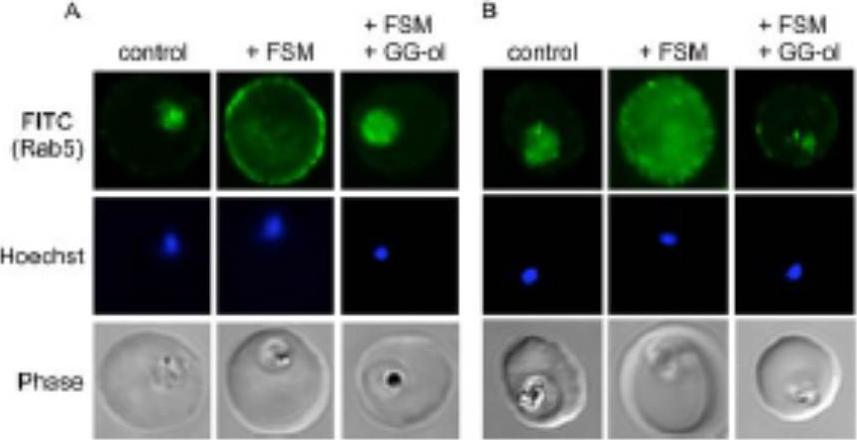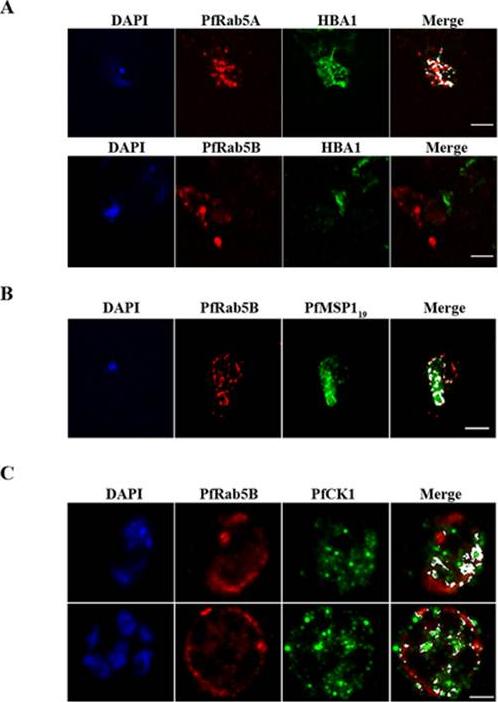PCHAS_0310200 ras-related protein Rab-5A, putative (RAB5a)
Disruptability [+]
| Species | Disruptability | Reference | Submitter | |
|---|---|---|---|---|
| P. berghei ANKA |
Refractory |
RMgm-821 | Imported from RMgmDB | |
Mutant phenotypes [+]
| Species | Stage | Phenotype | Reference | Submitter |
|---|---|---|---|---|
| P. falciparum 3D7 | Asexual |
Cell cycle arrest |
28288121 Knock-sideways to nucleus or diCre gene excision led to arrest at the late schizont stage |
Theo Sanderson, Wellcome Trust Sanger Institute |
Imaging data (from Malaria Metabolic Pathways)

Confocal immunofluorescence with either anti-PfRab5a (A) or anti-PfRab5c (B) in untreated parasites (control) compared to fosmidomycin (+ FSM) and fosmidomycin + geranylgeraniol (+FSM +GG-ol) treated parasites. Pf-Rab5a and Pf-Rab5c were dispersed in punctae throughout malaria parasite cells. Upon fosmidomycin treatment, a dramatic mislocalization of Rab5a occurred in the majority of treated cells, such that Rab5a was no longer present within the parasite cell, but instead was found at the membrane of the host erythrocyte.Howe R, Kelly M, Jimah J, Hodge D, Odom AR. Isoprenoid biosynthesis inhibition disrupts Rab5 localization and food vacuolar integrity in Plasmodium falciparum. Eukaryot Cell. 2013 12(2):215-23 .
See original on MMP
PfRab5B colocalises with PfMSP1 and PfCK1, but not with haemoglobin. (A) PfRab5A colocalises with haemoglobin (HBA1) containing vesicles unlike PfRab5B. (B) PfRab5B colocalises to differing degrees with the C-terminal 19 kDa fragment of PfMSP1 on structures close to the food vacuole and the parasite nucleus shown in blue by DAPI staining. (C) PfRab5B colocalises with PfCK1 on intracellular structures and at the parasite plasma membrane. Areas of colocalistaion are shown in white and used to calculate Pearson’s r coefficients. Scale bars, 2 mm.Ezougou CN, Ben-Rached F, Moss DK, Lin JW, Black S, Knuepfer E, Green JL, Khan SM, Mukhopadhyay A, Janse CJ, Coppens I, Yera H, Holder AA, Langsley G. Plasmodium falciparum Rab5B Is an N-Terminally Myristoylated Rab GTPase That Is Targeted to the Parasite's Plasma and Food Vacuole Membranes. PLoS One. 2014 9(2):e87695
See original on MMP
Immunolocalization of a constitutively active GTPase mutant of Rab5a. The immunoelectron micrograph shows a parasite expressing GFP-Rab5a (Q102L) - a constitutively active mutation. The section was probed with gold-conjugated anti-GFP antisera. Note that numerous gold particles decorate the hemoglobin-containing vacuole (HV) (Inset). The food vacuole (FV) and the nucleus (N) are indicated. (Scale bar, 1 µm.) Because this is merely 2D immuno-TEM, we cannot precisely determine whether the parasite is a trophozoite or a schizont.Elliott DA, McIntosh MT, Hosgood HD 3rd, Chen S, Zhang G, Baevova P, Joiner KA. Four distinct pathways of hemoglobin uptake in the malaria parasite Plasmodium falciparum. Proc Natl Acad Sci U S A. 2008 105(7):2463-8. PMID:
See original on MMP
Mislocalization of Rab5 proteins by fosmidomycin treatment. (A and B) Confocal immunofluorescence with either anti-PfRab5a (A) or anti-PfRab5c (B) antibody in untreated parasites (control) compared to fosmidomycin-treated (FSM) and fosmidomycin- and geranylgeraniol-treated (FSM GG-ol) parasites. FITC, fluorescein isothiocyanate. protein prenylation is typically required for the localization and function of small GTPases, such as Rab5. Pf-Rab5a and Pf-Rab5c were dispersed in punctae throughout malaria parasite cells . Upon fosmidomycin treatment, a dramatic mislocalization of Rab5a occurred in the majority of treated cells, such that Rab5a was no longer present within the parasite cell but instead was found at the membrane of the host erythrocyte. Similarly, fosmidomycin treatment mislocalized Rab5c, which became diffusely localized throughout both the parasite cell and the host erythrocyte cytoplasm.Howe R, Kelly M, Jimah J, Hodge D, Odom AR. Isoprenoid biosynthesis inhibition disrupts Rab5 localization and food vacuolar integrity in Plasmodium falciparum. Eukaryot Cell. 2013 Feb;12(2):215-23. PMID:
See original on MMP
Functional analysis of N-terminally tagged Rab5a. (a–c) Cell lines comparing KS (a) and KS in the presence of a complementing functional copy of Rab5a (b) and after gene excision (c). Left, representative fluorescence microscopy images. Three different GFP-2×FKBP-Rab5a parasite lines were generated to perform KS with a nuclear mislocalizer (cell line 1), KS in the presence of a complementary copy of Rab5a (cell line 2) or excision of the functional gene with inducible Cre recombinase9–11 (cell line 3). After addition of rapalog to cell line 1, GFP-2×FKBP-Rab5a was efficiently mislocalized into the nucleus, and no detectable protein remained in the cytoplasm (a). In contrast, the second cell line, which expressed a complementary copy of Rab5a in addition to GFP-2×FKBP-Rab5a, grew normally after rapalog addition (b). In the third cell line, rapalog addition to dimerize split Cre led to excision of the functional copy of rab5a and to a phenotype comparable (c).Birnbaum J, Flemming S, Reichard N, Soares AB, Mesén-Ramírez P, Jonscher E, Bergmann B, Spielmann T. A genetic system to study Plasmodium falciparum protein function. Nat Methods. 2017 Mar 13. PMID: 28288121
See original on MMPMore information
| PlasmoDB | PCHAS_0310200 |
| GeneDB | PCHAS_0310200 |
| Malaria Metabolic Pathways | Localisation images Pathways mapped to |
| Previous ID(s) | PC302156.00.0, PCAS_031020, PCHAS_031020 |
| Orthologs | PBANKA_0308000 , PF3D7_0211200 , PKNH_0410100 , PVP01_0413800 , PVX_002970 , PY17X_0308600 |
| Google Scholar | Search for all mentions of this gene |